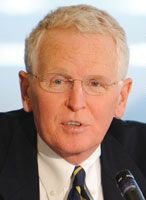S. Ward Casscells, MD: Prostate Cancer

”Gee, there are a lot of metastases here. What is your primary cancer?” These were the words that I heard back in 2001 from the radiologist looking at my MRI scans. I was shocked. I had never had a diagnosis of cancer and did not even suspect it. Since that day my prayers have been answered, and although none of the numerous treatments I have received – some through clinical trials – have cured my disease, they have gotten me to today. I am in my fifth remission.
A PSA test the day after I had received my MRI results revealed a PSA level of 94, which is more than 20 times higher than the level considered normal. A subsequent prostate biopsy showed that I had a highly aggressive prostate cancer that had already spread through my body. My doctors told me that the textbooks would say that I had just three years left, but they felt that if I was willing to endure a tough series of radiation, chemotherapy and anti-hormone therapies, they could get me eight years, maybe more. I was 49 years old, married with three young children, and of course I was going to fight it in any way I could.
I began treatment the day that I met my oncologist. He prescribed ketoconazole and promised me I would feel better the next day. I was very surprised because ketoconazole is usually used as an anti-fungal cream, but it turns out that it also rapidly reduces testosterone levels. I was amazed to find that sure enough it made me feel better overnight.
What followed was a treatment program of radiation and various chemotherapies. It was very hard on my body, but I responded very well. After six months, my PSA was undetectable, and I was in remission. I am very grateful that I had a doctor who believed that an aggressive course of treatment could benefit me and extend my life; I knew several people at the time who were not lucky enough to be offered these therapies, and they sadly passed away.
Over the next couple of years I had several recurrences, and each time I would have surgery to remove or chemotherapy to destroy the returning tumors. But after two years we ran out of treatment options, and I began participating in a series of clinical trials. Some drugs, like abiraterone (Zytiga), slowed or halted my disease for a time, while others, like MDV3100 (enzalutamide), seemed not to benefit me at all. Some people might consider my participation in these trials as unsuccessful because my disease kept progressing, but some of the therapies helped keep my disease in check for a few months. It is now more than 11 years since my diagnosis, and I am still working. I have seen my children grow up to become teenagers. I also believe that anything – any approved therapy, any drug under development and any dietary modification that has been suggested to be beneficial – that gives you a chance to live, even a little longer, buys time for a more successful treatment to be developed.
I hope that by sharing my cancer experience I can teach others the value of participating in clinical trials. I might have gained only a little benefit from the experimental drugs I received through the trials, but my involvement will ultimately help thousands of future patients. It is imperative that we – patients, doctors, researchers and those that make funding decisions – work together to make it easier to conduct clinical trials so that no stone is left unturned in the quest to improve the lives of cancer patients everywhere.
The AACR was saddened to learn that Dr. Casscells passed away on Oct. 14, 2012. We are deeply grateful to Dr. Casscells for sharing the story of his ten-year battle against aggressive prostate cancer, including five remissions, and allowing us to chronicle it in the AACR Cancer Progress Report 2012 to help educate others. We send our sincere condolences to Dr. Casscells’ family and friends.